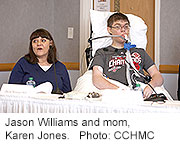
WEDNESDAY, Oct. 17 (HealthDay News) — A man with Duchenne muscular dystrophy who received a device to help his heart’s left ventricle pump blood throughout his body could represent a breakthrough in the treatment of the disease, according to his doctors.
Jason Williams, 29, of Peebles, Ohio, is believed to be one of the first U.S. patients with Duchenne muscular dystrophy to receive an implanted ventricular assist device, the Cincinnati Children’s Hospital Medical Center team said.
Ventricular assist devices are mechanical pumps implanted in the chest to help a weakened heart pump blood to the rest of the body.
Eighty percent of boys and men with Duchenne muscular dystrophy die of heart failure, according to a medical center news release. Due to the severity of their muscle disease, they are not typically candidates for heart transplant or some other treatment options available to patients with other types of muscular dystrophy.
“This is a major milestone in the care of Duchenne muscular dystrophy,” Dr. John Lynn Jefferies, director of the heart failure and ventricular assist device programs at the Cincinnati Children’s Heart Institute, said in the news release. “This treatment offers the possibility to change the outcome and the lives of these young men in a significant way that has never been realized up until now.”
Duchenne muscular dystrophy is an inherited disorder. It affects mostly males and many patients need a wheelchair before the age of 12. Patients with later stages of the disease experience severe difficulty breathing and heart problems, and many patients die in their late teens or early 20s.
Williams explained his decision to receive the ventricular assist device.
“I wanted to live longer with a better quality of life, and help other people — those with Duchenne facing heart failure and death,” Williams said in the news release. “I hope that doctors and surgeons can learn from my surgery and my recovery and be able to offer this treatment to other men and boys with Duchenne.”
Each year, about 2,500 people worldwide are born with Duchenne muscular dystrophy. By age 21, every Duchenne patient has a heart muscle disease called dilated cardiomyopathy.
More information
The U.S. National Human Genome Research Institute has more about Duchenne muscular dystrophy.

